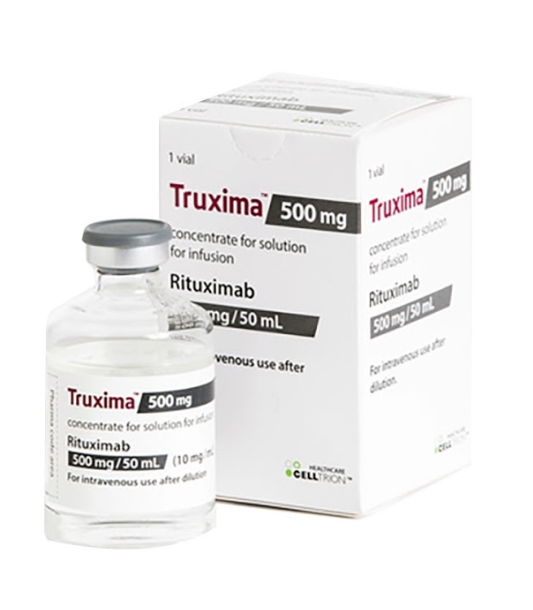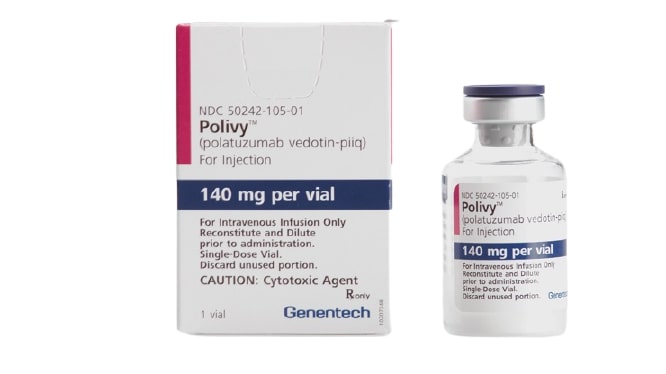Truxima (rituximab) vs Polivy (polatuzumab vedotin-piiq)
Truxima (rituximab) vs Polivy (polatuzumab vedotin-piiq)
Truxima (rituximab) is a monoclonal antibody that targets the CD20 protein found on the surface of B cells and is commonly used to treat certain types of non-Hodgkin lymphoma and chronic lymphocytic leukemia, as well as rheumatoid arthritis. Polivy (polatuzumab vedotin-piiq), on the other hand, is an antibody-drug conjugate that combines an antibody targeting the CD79b protein on B cells with a chemotherapy drug, and is used specifically for the treatment of relapsed or refractory diffuse large B-cell lymphoma, often in combination with other drugs. When deciding between Truxima and Polivy, it is crucial to consider the specific type and stage of lymphoma being treated, the patient's overall health, and previous treatments, as these factors will influence the effectiveness and suitability of each medication.
Difference between Truxima and Polivy
| Metric | Truxima (rituximab) | Polivy (polatuzumab vedotin-piiq) |
|---|---|---|
| Generic name | Rituximab | Polatuzumab vedotin-piiq |
| Indications | Non-Hodgkin's lymphoma, chronic lymphocytic leukemia, rheumatoid arthritis, granulomatosis with polyangiitis, and microscopic polyangiitis | Previously untreated diffuse large B-cell lymphoma, in combination with bendamustine and a rituximab product |
| Mechanism of action | Targets CD20 antigen on B cells and mediates B cell lysis | Targets CD79b on B cells and delivers an anti-cancer agent (MMAE) into the cells |
| Brand names | Truxima, Rituxan | Polivy |
| Administrative route | Intravenous infusion | Intravenous infusion |
| Side effects | Infusion reactions, fever, lymphopenia, chills, infection, asthenia | Neutropenia, thrombocytopenia, anemia, peripheral neuropathy, fatigue, diarrhea |
| Contraindications | Severe, active infections and severe immunocompromised states | None known specifically; use with caution in patients with infections or compromised immune systems |
| Drug class | Monoclonal antibody | Antibody-drug conjugate |
| Manufacturer | Celltrion Healthcare, Genentech | Genentech |
Efficacy
Truxima (rituximab) Efficacy in Lymphoma
Truxima, a biosimilar to the original rituximab product, is a monoclonal antibody that targets the CD20 antigen on the surface of pre-B and mature B lymphocytes. It is used in the treatment of non-Hodgkin lymphoma (NHL), a group of blood cancers that includes both indolent (slow-growing) and aggressive (fast-growing) forms of lymphoma. Clinical trials and studies have demonstrated that rituximab, when used in combination with chemotherapy, improves overall survival and response rates in patients with various subtypes of NHL, including follicular lymphoma and diffuse large B-cell lymphoma (DLBCL). The addition of rituximab to chemotherapy regimens has become a standard of care in the treatment of these lymphomas, significantly improving patient outcomes.
Polivy (polatuzumab vedotin-piiq) Efficacy in Lymphoma
Polivy (polatuzumab vedotin-piiq) is an antibody-drug conjugate that combines a monoclonal antibody targeting CD79b, a protein expressed on the surface of B cells, with a potent cytotoxic agent. It is approved for use in combination with bendamustine and rituximab for the treatment of adult patients with relapsed or refractory diffuse large B-cell lymphoma (DLBCL), who are not candidates for hematopoietic stem cell transplant. Clinical trials have shown that this combination therapy can lead to complete responses in a significant proportion of patients, offering a new treatment option for those with limited alternatives due to the aggressive nature of relapsed or refractory DLBCL.
Comparative Efficacy in Lymphoma Treatment
While both Truxima and Polivy are used in the treatment of lymphoma, their mechanisms of action and indications differ. Truxima is often used as a first-line treatment in combination with chemotherapy, and its efficacy has been well-established over the years. Polivy, on the other hand, is used in a more targeted manner for patients with relapsed or refractory DLBCL who have limited treatment options. The efficacy of Polivy in this context provides hope for improved outcomes in a population with a high unmet medical need.
Conclusion
In conclusion, both Truxima and Polivy have shown efficacy in the treatment of lymphoma, albeit in different settings and lines of therapy. Truxima as a biosimilar to rituximab retains the efficacy profile of the reference product and continues to be a cornerstone in the management of NHL. Polivy represents a newer class of targeted therapies that has shown promising results in the treatment of relapsed or refractory DLBCL, offering an additional therapeutic option for patients who have progressed on or after other treatments. The use of these medicines should be guided by a healthcare professional, taking into account the specific subtype of lymphoma and the individual patient's treatment history and overall health condition.
Regulatory Agency Approvals
Truxima
-
European Medical Agency (EMA), European Union

-
Food and Drug Administration (FDA), USA

-
Health Canada

-
Therapeutic Goods Administration (TGA), Australia

-
Medsafe (NZ)

Polivy
-
Food and Drug Administration (FDA), USA

-
Pharmaceuticals and Medical Devices Agency (PMDA), Japan

-
Therapeutic Goods Administration (TGA), Australia

Access Truxima or Polivy today
If Truxima or Polivy are not approved or available in your country (e.g. due to supply issues), you can access them via Everyone.org.
How it works

Make an enquiry
Choose the medicine you want to buy, answer a couple of questions, and upload your prescription to speed things up. We’ll get back to you within 24 hours.


Make an enquiry
Choose the medicine you want to buy, answer a couple of questions, and upload your prescription to speed things up. We’ll get back to you within 24 hours.


Breeze through the paperwork
We'll guide you through the required documents for importing unapproved medicine, ensuring you have all the necessary information.


Get a personalized quote
We’ll prepare a quote for you, including medicine costs and any shipping, administrative, or import fees that may apply.


Receive your medicine
Accept the quote and we’ll handle the rest - sourcing and safely delivering your medicine.

Some text on this page has been automatically generated. Speak to your physician before you start a new treatment or medication.
Let's talk
If you have any questions, call us or send us a message through WhatsApp or email:
Contact us




